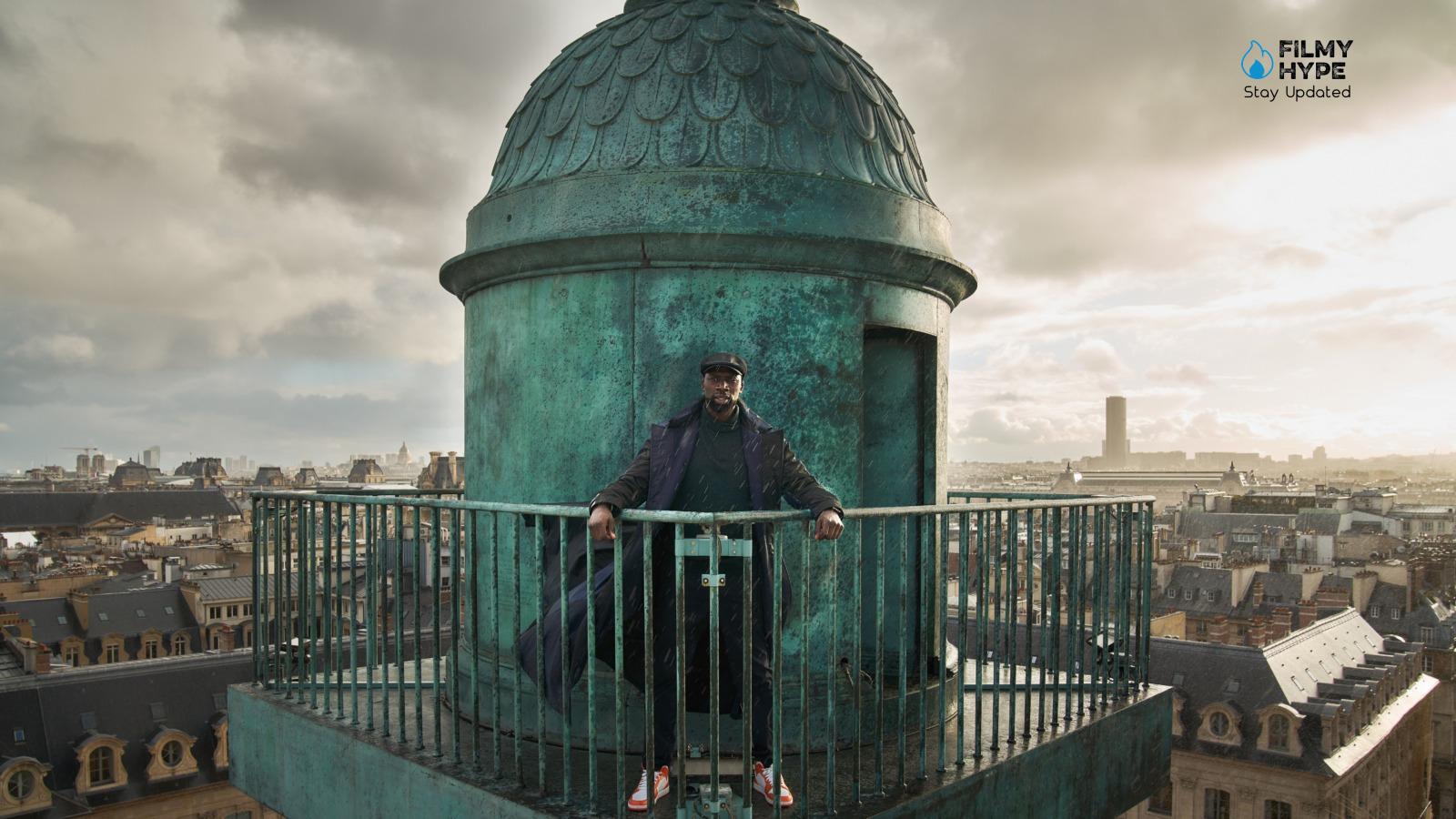Lupin Season 3 Review (Part 3): Lupin Reconfirms Itself as The True Jewel of Netflix
Cast: Omar Sy, Ludivine Sagnier, Soufiane Guerrab, Etan Simon, Antoine Gouy, Shirine Boutella, Mamadou Haidara
Director: Ludovic Bernard
Streaming Platform: Netflix
Filmyhype.com Ratings: 3.5/5 (three and a half stars)
The wait has finally come to an end on October 5, when Lupin Season 3 debuts on Netflix, the French series is freely inspired by the novels of Maurice Leblanc in which Omar Sy lends his face, physicality, and prowess to the gentleman thief Assane Diop, a true master of theft. A man whose kinship is not only linked to the character born from Leblanc’s pen and who also became famous thanks to the anime Lupin Season 3 but also many other literary characters. The first two seasons of the series produced by Gaumont led the protagonist to increasingly resemble a modern and less complicated version of Edmond Dantés, the protagonist of The Count of Monte Cristo. Assane‘s ability to steal, in the first two seasons, was driven above all by a desire for revenge and revenge, to repay a debt that the story owed to his family. In this new arc of episodes, however, Assane Diop is grappling with another challenge, equally intimate and complicated, as we will try to explain in this review of Lupin Season 3, of which we saw the first two episodes in preview. Two episodes which, alone, have already dictated the pace and rhythm of an entire season.

If you didn’t appreciate the absurdity of some of the dynamics of the previous seasons, get ready: in Lupin Season 3 the adventures of Assane Diop will reach heights never reached before. Perhaps precisely in the absolute madness and unpredictability of some choices the series almost manages to equal the first season, certainly proving decidedly more interesting than the second. Omar Sy once again proves perfect in the role and convincing in the most touching scenes. Never before has the protagonist played multiple roles and taken on the role of anyone to carry out his plan and save his family. Don’t worry about Lupin Season 3 fun is guaranteed. Ready to venture with us into the third part of Lupin? All, as always, strictly without spoilers. We would like to point out that in the following review, there will be spoilers relating to the first two parts of Lupin, therefore we invite you to continue the review only if you are up to date with the new seasons of the TV series. We remind you that Lupin is a series divided into three parts, it is not an anthology show. To better understand the thread of events, although each season develops a new adventure, it is strictly necessary to have viewed the previous seasons.
Lupin Season 3 Review (Part 3): The Story Plot
Lupin Season 3 picks up more or less where the previous season ended. Assane is on the run, forced to live in hiding to allow his wife and son to take back a life that his presence had complicated and brought into the spotlight. However, his voluntary exile is forced to end when the past and the need to see his family again force him to return to Paris, a sprawling city that can’t wait to close its jaws on the most wanted gentleman thief in France. The return to the beautiful Ville Lumière, however, leads Assane to face the shadows and regrets of the past: while memories crowd behind his eyelids and childhood opens before him like a book still full of twists and turns, Assane will have to take delicate and important decisions, which risk putting him in danger. More than it has been in the past.
After managing to avenge his father and have Pellegrini arrested for framing him years earlier, Assane is forced to flee. The police consider him one of the most wanted thieves. At the same time, however, people celebrate him as a sort of new social hero capable of punishing the rich and powerful. In reality, Diop doesn’t recognize himself in any of these roles. Rather, his greatest concern is for his wife and son, who. in Paris are paying a rather high price for his actions. For this reason, therefore, he decides to leave his Marseille hiding place and return to their lives. What he doesn’t know, however, is that waiting for him is the biggest shock of his life but, above all, a person arriving directly from the past and oblivion. At the end of the second season, we left Assane as he managed to elude, right at the moment, an entire police assault team while standing in plain sight on the stage of a theater. Its ultimate goal seems to have been achieved. Pellegrini is arrested for having attempted fraud with the false disappearance of the precious necklace in his possession and for having framed Diop’s father many years earlier.

So, as the curtain falls on this personal story, Assane decides to disappear and make himself invisible to the world. On the other hand, he is the number one most wanted by the police while public opinion celebrates him as a new Robin Hood who fights the powerful. In this sense, he becomes a symbol also and above all for the many Senegalese immigrants who populate the poor neighborhoods of Paris. Despite this, however, he is far from finding peace. Hidden in the streets of Marseille he contemplates returning to take away his wife and son, persecuted by the press. However, when Claire greets him coldly, blaming him for the situation they are experiencing, she realizes that he has much more to do. For this reason, in the back room of his trusted friend, Ben plans one of the most ambitious plans of his career: the theft of the precious black pearl.
Years before, Assane had already attempted to steal it, failing and managing to escape from the police at the last minute. Today, however, the stakes are much higher. On the table, is the definitive serenity of his family. In fact, with part of the money obtained from the sale of the jewel, he wants to buy an estate in the countryside where they can live together hidden from the world. How to succeed, though? Once again, he is inspired by Arsène Lupin through the pages of the novel The Black Pearl. Here, Diop understands how to perform the most incredible illusionistic trick of all: staging his death. Even though everything has been planned down to the smallest detail, someone from his past arrives to further ripple the waters. This is a person who re-emerges with a devastating emotional and affective strength. The only one capable of making him fall into a trap despite the awareness of deception and danger.
Lupin Season 3 Review (Part 3) and analysis
The third season of the series, as I mentioned at the beginning, is full of unpredictable twists. If you thought Assane‘s plans were crazy and practically impossible in the first two seasons, then you need to prepare yourself psychologically for what you will see in the next seven episodes. The madness and absurdity of the series is pushed to the nth degree. Is too much a bad thing? Or does the show make this excessiveness and irreverence its winning weapon? The writer believes that a series like Lupin is necessary within the Netflix catalog. Do you remember the criticisms we made about La Casa de Papel years ago? At the time of the success of both the first two seasons and the following ones, the show that had the highest viewership show was constantly accused of excessive unrealism. The two robberies orchestrated by the professor and carried out by the gang were considered by critics to be unlikely to materialize in reality.
However, the public loved the series, the characters, and the themes so much that they abandoned the logic of certain dynamics and let themselves be carried away by the emotions. We have seen the same fate in recent years with Squid Game, the Korean series that has managed to conquer the heights of Netflix, capturing the attention of even the most skeptical and becoming a true cult phenomenon in a very short time. Lupin followed in the footsteps of the shows that preceded it and merged the local matrix with the typical madness of the Netflix series just mentioned. Netflix viewers love these stories full of humanity and over-the-top adventures. Even if not, everything adds up and many resolutions seem impossible when the fun and pleasure of viewing is high everything is forgiven.

Lupin Season 3 does just that: it amuses and entertains. The second season had probably stretched the story excessively and appeared at times, especially in the first part, as slow and forced. If desired, could the series have ended in two seasons? Sure. But who would be so economically foolish as to suppress a product that works and can be continued for a long time? Nobody! As in previous seasons, also in Lupin Season 3 the flashbacks dedicated to the protagonist mark the rhythm of the narrative and allow us to get to know Assane and his family even better. In the new chapters, we immediately witness a theft that occurred before the start of the first season, the theft of the black pearl, which turns out to be decisive for the story that will be told in the current season. Assane develops a plan that represents both his revenge for a past mistake and a certain escape route for him and his family. Unfortunately, not everything goes as smoothly as expected and during the execution, someone manages to understand that Assane‘s brilliant plan was just an extraordinary staging.
In previous seasons we have known the importance that the father figure had on the protagonist, how much it shaped him into becoming the man he is now, and how much it pushed him to act according to his only belief. In Lupin Season 3 the writers chose to tell us about the complicated relationship between Assane and her mother. The two have not spoken for 30 years and Assane grew up without the care of his mother who never left Senegal to reunite with her family. However, when the past comes knocking on the door again, our Lupin is unable to close it. The protagonist of the Netflix series is accused by everyone of being too selfish and of acting exclusively for personal benefit but in Lupin Season 3 he will prove the opposite. Between complicated relationships with his parents, unlikely missions, and very current themes, Lupin returns as the protagonist of Netflix’s autumn catalog, and perhaps this won’t be the last time.
As we anticipated above, Lupin is a TV series that has managed to conquer a huge audience, attracting readers who are passionate about Maurice Leblanc‘s saga and gaining more and more followers. The Netflix show has made the location a strong point. Paris is one of the great protagonists of the show. The city vibrates, it is a participant and accomplice in every Lupin’s robbery. As in the novels and the TV series, Lupin expertly uses his knowledge of the French capital to his advantage, creating escape routes at every corner. In addition to the local matrix, another ace up Lupin‘s sleeve is the literary origin of the series. The show is a real reinterpretation of the literary saga starring Arsenio Lupin. Netflix, wisely, managed to understand that a slavish adaptation would have been difficult and perhaps too similar, at least in terms of vibes, to other successful products on the platform.

So Netflix has chosen to make Lupin a literary saga even within its show and to create a figure like that of Assane capable of being inspired by the gentleman thief but remaining a distinct character. By doing so the show is potentially renewable as long as it is successful. It is not even necessary that the thief always has the face of Assane, in the future the protagonist’s son could easily take over from his father and the series could continue without any problem. It is no coincidence that Netflix has not yet announced how many seasons the series will consist of… In the case of Lupin, Netflix has understood how to make literary reinterpretations its own.
Lupin Season 3 starts immediately in fifth gear. The first episode of the new season, in fact, immediately stages an almost irresistible change of pace. Having closed the case in which Assane was the protagonist in the first two seasons, the French series focuses on a new story, which is new not only in its narrative choices but also addresses the relationship between character and literary character with greater awareness. In this new season, Assane increasingly becomes Lupin‘s alter ego, his personification outside the world of paper and ink, in which he was conceived. This means that the viewer is not only entertained by Assane‘s blows and how he manages to get the upper hand, but also by the parallels that can be created with Lupin himself:, therefore, Leblanc’s novel is no longer only the source of inspiration for the series, but it almost becomes a real instruction manual for trying to understand Assane‘s character, more than it has been in the past.
Suddenly it is as if the spectator has to learn again about this changing and changing character, forced to always wear different masks. The first episode, in particular, is a real prologue: a story that unfolds on three temporal planes and which not only showcases Assane‘s now well-known skills but above all brings him back to the center of the action. Those who feared that after the first two seasons, the series had nothing more to say would change their minds in a very short time. Assane was forced to leave Paris, to remain in hiding, in hiding. But his return, necessary above all for him, is an obvious element that the series manages to manage with a truly pressing pace and some jaw-dropping ideas. An element that has not changed over the seasons of Lupin is that meandering feeling of melancholy and nostalgia that characterizes many of the episodes in which the audience is allowed to spy into the thief’s past.

This man who, especially at the beginning, is shown to us as a confident and fearless gentleman, hides wounds that have never stopped bleeding, scars that the past has dug into his skin and soul. A feeling that emerges even more forcefully in this new arc of episodes, as demonstrated by the first two shown in the preview. Assane, in this third season, is forced more than ever to face what time has stolen from him: time with his father, the closeness of a mother, and a childhood dedicated only to the ambition of fulfilling himself as a human being. The real protagonist of this season is “wasted time”: not the wasted time, but the one that was taken away from Assane, the one of which he was deprived at the behest of others, richer and more powerful. The episodes also become a way, therefore, to bring to the small screen the spark of popular anger that is part of French culture and which, today more than ever, becomes a piece not to be underestimated when talking about the division of the world between rich and poor, between a government ready to devour everything and a “third state” that feeds it despite itself.
The first two episodes of Lupin Season 3, therefore, take the viewer on an arduous road, divided between current affairs and the past, between the desire to move forward and the spasmodic need to go back, to look that time in the face that was now thought to be lost, with the fear that seeing it too closely we might risk losing sight of the things that matter. Although it certainly cannot be defined as the most original series in the world, Lupin Season 3 captures the public’s attention and does so until the end. As has been remembered, the second season of Lupin ends with the resolution of the Pellegrini case and the necklace stolen many years before. This means that Assane managed to bring justice and avenge his father who was unjustly accused of theft and killed in prison. Now that the revenge thread has been exhausted, what is the engine that drives the new seven episodes of the third part?

The answer is to be found, once again, in Diop’s personal and emotional sphere. As has been clear since the first season we are not faced with a solitary character despite the intrigues and deceptions that characterize his existence. Assane, rather, has an emotional past and present that have a profound impact on his actions. And it is in this pool of invisible but existing bonds that narratively we draw on to build a new path. With a narrative style that is always very dry and free from emotional exaggerations, therefore, new pages of his past are opened which, in a constant and silent dialogue, influence the man he has transformed into. A narrative choice that is certainly not innovative or potentially full of surprises but which, if well managed in the subsequent evolution, can offer Diop an important opportunity to complete his evolutionary arc. Indeed, from the initial assumptions, this third party may have a conclusive intention. But it’s never said. On the other hand, we are always dealing with the ideal heir of Arsenio Lupin.
Lupin Season 3 Review (Part 3): The Last Words
Now in its third season, the Netflix television series starring Omar Sy still follows the narrative scheme of the beginning. This means that, by continuing to dig into Assane‘s past, it is possible to find new motivations to expand the story. A choice, therefore, is certainly not innovative but could lead the character towards a more in-depth exploration of himself, perhaps closing a personal parable. To this, then, is added an always agile, meticulous, and particularly engaging reconstruction of the illusions carried out by Diop, involving the public in a continuous race for salvation. If you loved the first part of Lupin you will love this third too. The adrenaline and madness typical of Arsenio Lui/Assane Diop’s plans return forcefully and leave room for guaranteed fun. The family and the mother-child relationship are the main themes of the new chapters. Impossible to get bored.







